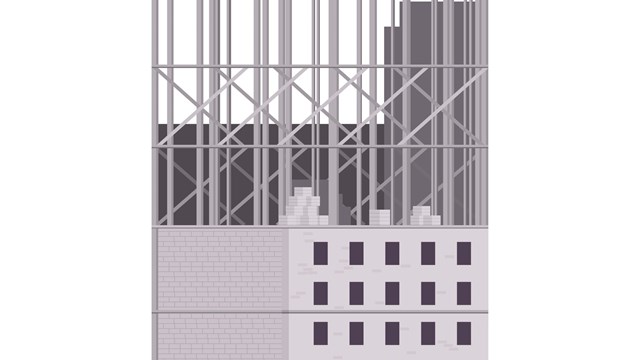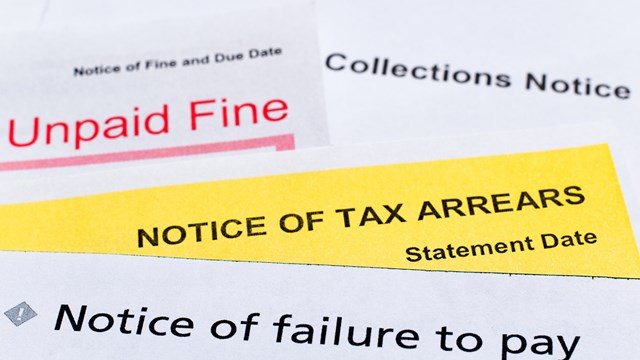Consider the (fictional) couple, Mr. and Mrs. Smith. They love their co-op apartment in a comfortable, convenient neighborhood in Hoboken, and have lived there for the last seven years, moving in when Mr. Smith took an editing job with a prestigious magazine across the river in Manhattan. He was making a great salary, and Mrs. Smith was enjoying her new career as an elementary school teacher. When the economy took a hit last year however, Mr. Smith’s magazine took a major hit—advertisers bailed, and the magazine was forced to eliminate his position. Mr. Smith has had a hard time finding a job ever since, and Mrs. Smith’s salary isn’t enough to make ends meet. The couple has been struggling—and they’ve missed several maintenance payments.
Their cousins, the Jacksons, own a condo in Jersey City. Unfortunately, they are experiencing some of the same struggles as their Hoboken relatives. The Jacksons have also experienced layoffs from their jobs and, as a result, have fallen behind on their bills. They’ve exhausted every avenue of financial help and have defaulted on their mortgage—missing several payments as well as monthly dues payments to their homeowners’ association. Both couples are now facing foreclosure on their homes.
All Too Common
Unfortunately, this is a common scenario these days, both in New Jersey and around the country. More than 1.5 million foreclosure actions occurred last year and at the time of this printing, there was tax help for struggling homeowners, which could slow down the problem. Unfortunately, when a homeowner misses a payment, they aren’t the only ones affected. The entire building or homeowners association feels the effects of delinquency. That effect multiplies when there are more delinquent residents in associations with fewer units.
“Foreclosures on co-ops and condos affect the buildings because in order for the buildings to run they need to receive a certain amount of rent or common charges from their tenants,” says Joseph Colbert, a partner at Kagan Lubic Lepper Lewis Gold & Colbert, LLP in New York.
In reality, foreclosures really aren’t the preferred way of doing business. Nobody wants to see a homeowner fail at making their mortgage payments and ultimately lose their home. Banks and associations want to work with a delinquent customer to bring them up to date and save what could be a financial loss. After all, foreclosures aren’t just a mark on the homeowner’s record, but also on the building as well, affecting how lenders view the co-op or condo, and impacting its ability to borrow.
That being said, sometimes there’s simply no choice. No matter what the Smiths or Jacksons do, there may be no opportunity to save their homes from foreclosure. How these foreclosures are handled, however, differ.
When a unit owner defaults on their payments in a co-op building, Ronald L. Perl, partner and head of the community associations practice group of Princeton-based law firm Hill Wallack, says that it’s easier to foreclose because the shares are not real estate—but shares of stock. Thankfully, co-op owners can get a little extra assistance in the process.
“The banks are more likely to bring the account current because the shares can be taken back by the association,” he says. “Under the terms of the loan with the building—which is really a loan secured by shares of stock, as opposed to a real estate mortgage—the lender is entitled to make an advance to the delinquent unit owner’s association. If the unit owner still can’t pay after the advance, the lender is not going to pay forever.”
The unit owner will then be declared delinquent and evicted and shares will then be sold. This doesn’t go on indefinitely. “If a unit owner declares bankruptcy, it can slow the process down,” says Perl.” The exact details of the process are written in the building’s governing documents.”
A condominium foreclosure is different. When someone buys a condo, they own the unit they are living in outright and pay a mortgage to the bank. In addition, a unit owner is required to pay association dues, which are used to maintain and upgrade the common areas of the property. If a unit owner fails to make either payment, they can lose their property.
“A condo foreclosure process is the same as what a bank would go through with a mortgage of any property,” says Perl. “A notice goes out, and a foreclosure needs to be filed. This means that the bank is terminating the owner’s interest in the real estate and the property will be sold at a sheriff’s sale to settle the debt.”
A Last Resort
“I don’t prefer foreclosure in most association situations,” Perl continues, “although some lawyers are regularly doing foreclosures now instead of just suing people. Foreclosures are more time-consuming and expensive than a lawsuit for a money judgement. They can get a wage execution or levy on bank accounts and exhaust all other assets. Unfortunately, if this isn’t enough it can still force the sale of the unit.”
Something to consider, however, is that a foreclosure lawsuit can take a long time. “When a condominium unit owner falls behind on his or her end loan, the lender must commence a foreclosure lawsuit in state supreme court,” says Stephen M. Lasser, a partner in the law firm of Stark & Stark, which has several offices in New Jersey, Pennsylvania and New York City. “A foreclosure lawsuit can take several years to complete. When a condominium unit is finally sold at a foreclosure sale, the proceeds are first applied to the amounts owed to the lender, then to the amounts owed to the condominium—assuming the condominium recorded a lien against the unit and there is money left.”
There are examples of foreclosure that still may not work out to the benefit of the building or the association. “For example, says Perl, say a unit owner buys a home for $250,000. They mortgage $200,000 and put $50,000 down. Unfortunately, now the home is worth $180,000 and the unit owners don’t even have enough to pay that first mortgage. Where does the association go?
The bank will give an association up to six months of delinquent assessments, but in some cases, you can make a deal with the owner. “Boards have fiduciary duties that all owners pay their pro-rata share of maintenance or common charges,” says Lasser. “Boards can help a struggling resident by offering to enter into an extended repayment agreement. The board can protect the building’s interests by requiring the struggling resident to acknowledge their debt as part of the agreement, thereby reducing the chance that the resident will challenge the debt later. In addition, a board can offer to waive some late fees or interest on unpaid amounts at the end of the repayment term if all payments under the agreement are paid on time.”
Lasser recommends that boards act quickly when condo owners fall into arrears and encourage them to utilize the small claims part of the city or town court if the amount owed is less than the court’s jurisdictional threshold, which is typically $5,000.
“Once a lender commences its own foreclosure action against a condo owner, it rarely makes sense for a condo association to start or continue its own foreclosure action because the bank’s loan that is being foreclosed will typically have priority over the condo’s foreclosure action,” he says.
It’s also important for managers to keep good payment records, so if a problem arises, you have exact documentation of payments made. “If a unit owner fails to pay their dues, send a reminder notice, then another warning letter 35 to 60 days later and then, finally, turn it over to legal,” says Colbert.
The Manager’s Role
Managers may run into complications when dealing with a unit owner. For example, the unit owner may be falling behind financially, but might have a rental tenant occupying the unit. The owner—not the tenant—is responsible for the maintenance payments to the building. The tenant might be paying the unit owner, but the owner might not be paying the association. If that’s the case, says Colbert, “file a common charge lien, and notify the tenant that they have to pay the board directly. You may have to make some difficult decisions.”
In some cases, just initiating any kind of foreclosure, liens or legal paperwork is enough for an owner to pay the back payments. They may borrow from family or friends to get themselves caught up. However, this isn’t always the case and the owner may choose to take the loss. “It gets them out and forces the sale of the unit,” explains Perl. “This is good for the building because the next owner is more likely to be a performing owner when it comes to paying association fee.”
Of course, most buildings are going to encounter a defaulting resident every once in awhile, and usually it’s not the end of the world. But too many defaults and it can actually affect the association’s borrowing ability down the road. “Banks look at delinquency rates,” says Perl, “and in most cases an association has a line of credit with a lender set in advance. However, they may need some kind of credit later and a bank may look at these delinquencies as a credit risk. If 50 percent of the units are in collections, who would allow that association to borrow money?”
Sometimes all the unit owner needs is time to get through a difficult period. It’s important for the association to weigh the pros and cons of an arrangement with the unit owner versus the traditional methods of foreclosures. What steps can a board take to assist a struggling resident while still protecting the association’s interests?
“Someone might just be in hard times, and we’ve had times when someone can’t afford to live in the building, so we’ve agreed to a standstill while they put home on the market on a range of prices. They try to get market price, but if they don’t then they’ll go to foreclosure and have it auctioned.”
It’s a unique time in this world which calls for unique solutions to unique problems. There are more Smiths and Jacksons out there, so be prepared as to how to handle them without jeopardizing the building and the association.
Lisa Iannucci is a freelance writer, author and a frequent contributor toThe New Jersey Cooperator.







Leave a Comment